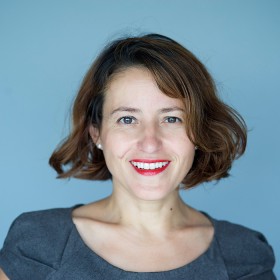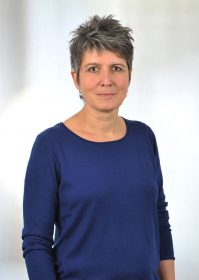An Interview with Ines Pohl
The European Union currently faces a tensile test: Great Britain’s vote to exit, the rise of rightwing populist movements, the lack of a solution to the flow of refugees, fear of terror attacks, and economic decline. Reference is often made, in the political debate about how to respond to these issues going forward, to history.
At our event, “Times of Crisis” on 7 September 2016, we would hence like to discuss the significance of the past for current European politics, particularly considering today’s problems, together with international guests from Great Britain, France, and Poland, as well as Germany. The panel will consist of Dan Diner, Dietmar Herz, Étienne François, Hans Kundnani, and Adam Michnik. The moderator will be Ines Pohl, of whom we asked four questions that extend our view to include the USA.
Nevin Ekinci: Ms. Pohl, you have been in Washington since the end of 2015 as the correspondent for Deutsche Welle. How do you perceive the debates about the current European “crisis,” from a distance? Would you even use the term “times of crisis?” → continue reading
The “Daughters and Sons of Gastarbeiters” (guest workers) are the Academy of the Jewish Museum Berlin’s guest on 14 October 2015, part of the “New German Stories” series. As children, these Berlin authors followed their parents to Germany from their home villages in Anatolia, southern Europe and the Balkans, or they were born into working-class neighborhoods around Germany. Their mothers and fathers were supposed to bolster the German economic recovery as mere “guest workers”. The authors tell their personal stories, look back, follow their parents’ paths and thus add to Germany’s culture of memory. In advance of the event, we’ve asked three questions of Çiçek Bacık, the project’s leader and co-initiator:

Çiçek Bacık © Neda Navaee
Ms. Bacık, how did the “Daughters and Sons of Gastarbeiters” come to be and what was the motivation to tell these personal stories?
Last year, I went to a reading with my friend, the journalist Ferda Ataman. We were sitting in a bar afterwards. “Ferda, we have to start telling our stories and share them with others. We ourselves have to shed light on a dark chapter of our past we’ve successfully repressed,” I said. “Sure, and what’s stopping us?” That was the starting point for “Daughters and Sons of Gastarbeiters”. Our first reading took place in January 2015 at the Wasserturm in Kreuzberg. → continue reading

